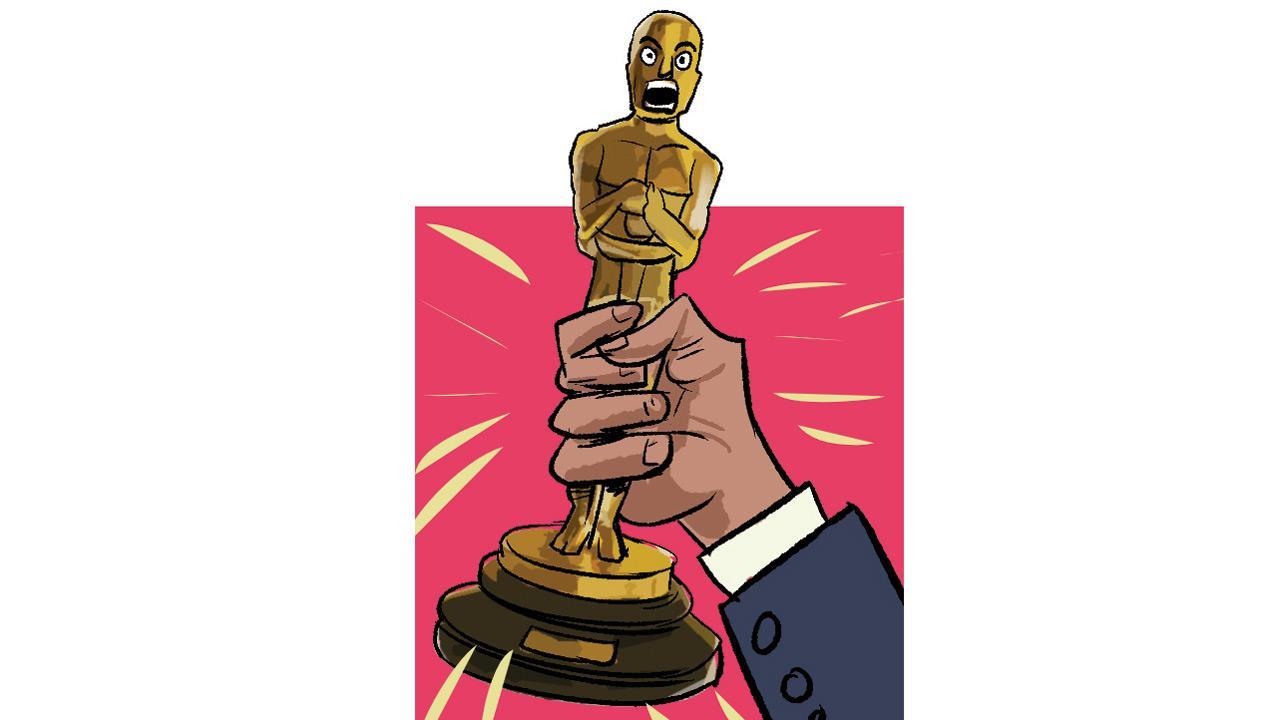The hot takes on this year’s Oscars are like members of the ton at the Featherington Ball, bristling at moral impropriety, as if that society was not based on immoral inequalities

Illustration/Uday Mohite
![]() Last week, I dodged several calls about toxic masculinity at the Oscars, because, well, #BoreMatKaryaar. How quaint to wag fingers at masculinity. As if the Academy were itself not the heart of straight, elite masculinity, cloaking itself in respectability by rewarding films in a pretty NGOish way for their po-faced tackling of ‘issues’. Representation matters. Who could disagree? But is simply not being disagreeable quite enough for art, entertainment or politics? Without the glamour of movie stars and clothes, the Big O would be quite an uncle. The hot takes on this year’s Oscars are like members of the ton at the Featherington Ball, bristling at moral impropriety, as if that society was not based on immoral inequalities.
Last week, I dodged several calls about toxic masculinity at the Oscars, because, well, #BoreMatKaryaar. How quaint to wag fingers at masculinity. As if the Academy were itself not the heart of straight, elite masculinity, cloaking itself in respectability by rewarding films in a pretty NGOish way for their po-faced tackling of ‘issues’. Representation matters. Who could disagree? But is simply not being disagreeable quite enough for art, entertainment or politics? Without the glamour of movie stars and clothes, the Big O would be quite an uncle. The hot takes on this year’s Oscars are like members of the ton at the Featherington Ball, bristling at moral impropriety, as if that society was not based on immoral inequalities.
ADVERTISEMENT
Bridgerton Season 2 (where this ball takes place) has also been subjected to this meaningless seriousness. Critics are primly denouncing it for having ‘no real sex’. Ah realism, the favourite costume of the respectable. Bridgerton Season 1 was kind of a bore, demanding we like it for politically correct reasons of diverse casting (and ok, some good looking people). But real sex? Really?
It’s strange to call the well-lit generic thrusting and picturesque O faces we see in movies real sex simply because there are naked people there.
One might argue it is often the opposite of sex. You represent the fact of sex, but don’t get into the details of what sex feels like—its transgressions, its corniness, the varied nature of desire. You do not risk trying to create eroticism for the audience, nor make the audience risk admitting it was turned on.
This kind of attitude has also often denounced Hindi films as prudish because they did not feature the kiss, as if they were not rife with burning desires of every kind, from smouldering eyes to heaving breasts and dirty double meanings. These squeaky clean so-called sex positive conversations are simply a way that elites keep deciding for others what is permissible or tasteful.
Bridgerton Season 2, however, has cast off its cloak and revealed itself to be the real thing. Like any good romance it is all about the sexual tension, the tropic buzz of hot people breathing hard when close, all made more urgent by the love being forbidden. The series brings back many traditional rom-com pleasures, including a constantly sparring twosome, witty women, feminist commentary on social hypocrisy and visual pleasures for the female and queer eye. In one scene, a nude model asks the man who is painting her if he will pose for her instead. He strips with humour and excitement, a role reversal evoking sexual meanings. The show knows the anticipation of sex is what excites the viewer’s eroticism and edges the audience towards that Big O.
Like many Western shows, Bridgerton seems flummoxed by India: masala chai made by putting elaichi in a strainer, hilarious dialogues like “have you read Ghaleeb” and pan-India terms—Appa, Bon—all in one family. But this Johnny Lever type lack of realism seems of a piece with the preposterous wigs, charming villains, characters with repeating quirks, sub-plots seething with insider-outsider tension, choice dialogues, betrayed friendship —a full thali of entertainment and pleasure. Almost like one of those emotionally saturated older Hindi films with songs, threatened romance and many character actors. The kind that never make it to the Oscars, you know?
Paromita Vohra is an award-winning Mumbai-based filmmaker, writer and curator working with fiction and non-fiction. Reach her at paromita.vohra@mid-day.com
 Subscribe today by clicking the link and stay updated with the latest news!" Click here!
Subscribe today by clicking the link and stay updated with the latest news!" Click here!





_d.jpg)


